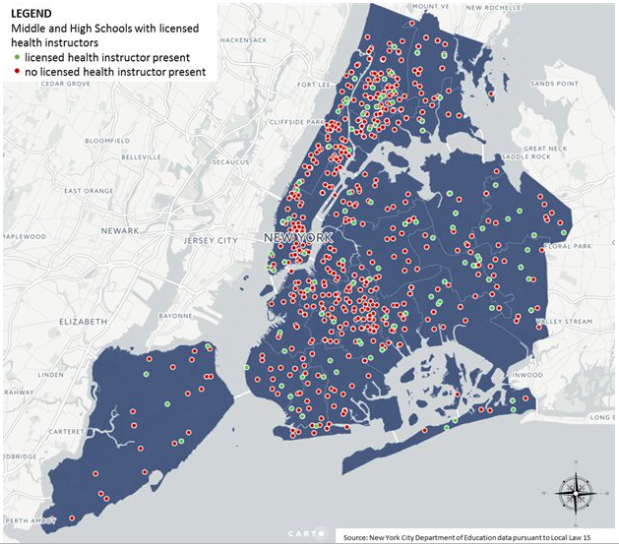Should Nutrition Be A Separate Class In Schools?


BROOKLYN — There’s no way to tell if students are getting the right amount of nutrition education in schools and some lawmakers want to change that.
Currently, nutrition talk throughout city schools is bundled into a 54-hour health class often taught by unlicensed instructors. Councilman Mark Treyger and Chair of the Council’s Education Committee introduced bill Int. 1283 which will require the Department of Education to specifically report all data on nutrition education.
Treyger’s bill was introduced last November and on Wednesday, followed by a rally on the steps of City Hall, lawmakers held a hearing with Department of Education officials on a slate of health and wellness resolutions and proposals for New York City schools.
As it stands, sex, HIV/AIDS and nutrition education all fall under the DOE’s health education mandate. For six-graders at MS 51 in Park Slope, the information session comes in the form of a one-hour health class just twice a year, an approach some parents feel is “unacceptable.”
“Food education belongs in school,” said Mariem Villamil who’s 11-year-old attends MS 51. “School is the place they can learn about food without having someone trying to sell them something.”
Some students never receive the minimum health requirements. Lindsay Harr, Executive Director of the DOE’s Office of School Wellness Programs noted only 37.2% eighth graders received the full 54-hour class.
Wellness organizations have pitched in to supplement nutrition education. Wellness In the Schools, which seeks to end childhood obesity through nutrition education, works with 14 Brooklyn locations. Studies show increased nutrition education improved the students’ consumption of healthier foods. The non-profit also provides healthy, from scratch-cooked meals.
“Access to healthy meals and quality nutrition education can have positive physical, mental and emotional health impacts for students now and in the future,” said Treyger whose constituents are based in Coney Island. “Our city should do everything we can to make sure students have the healthy, equitable, sustainable, and culturally responsive food access and education they deserve.
Treyger’s legislation would also specify the number of certified health experts at a school and would disaggregate the data by race, gender, and free- and reduced-price lunch status.
According to a 2017 Comptroller’s report, in middle and high schools, 97% of health instructors are not licensed, with a higher concentration affecting Manhattan and Brooklyn students.

In a hearing proceeding Treyger’s rally outside of City Hall on Wednesday, BOE officials acknowledged some shortcomings in the existing health mandates.
“It’s not just enough to have the right structures in place—we know that we know to need to work closely with schools to change the culture around health education and address the long-standing barriers to implementation,” testified Donald Conyers, Superintendent in the First Deputy Chancellor’s Office.
The slate of proposals incorporated Res. 632 to create diabetes and pre-diabetes based curriculum and Res. 716 to provide sex-education to students on regular bases. Res. 238 to ban processed meats in schools, a measure Councilman Fernando Cabrera introduced last March because of a 2015 report from the International Agency for Research or Cancer, connecting processed meet with cancer.
“Ban the bologna,” Cabrera said in the middle of the hearing.




